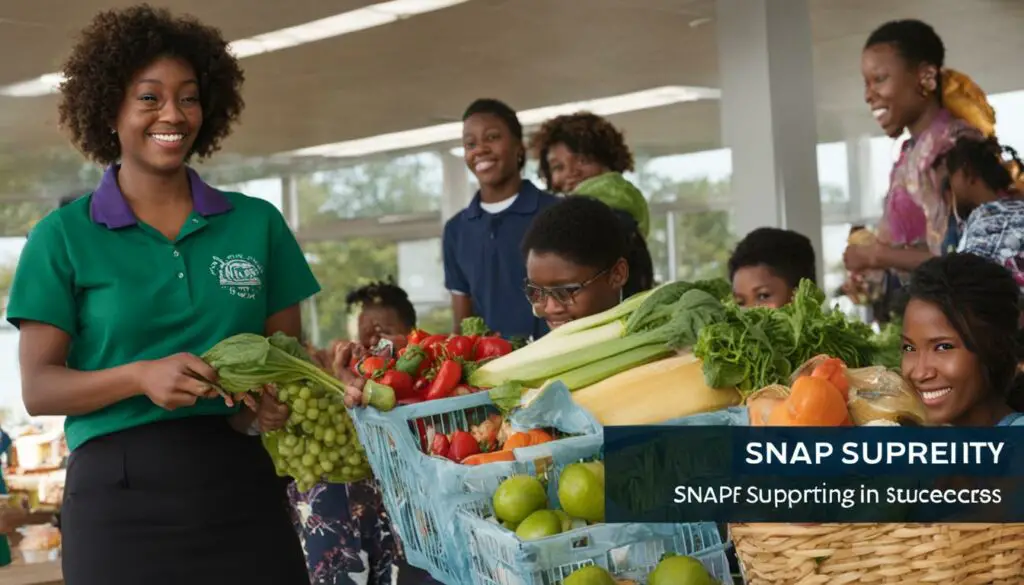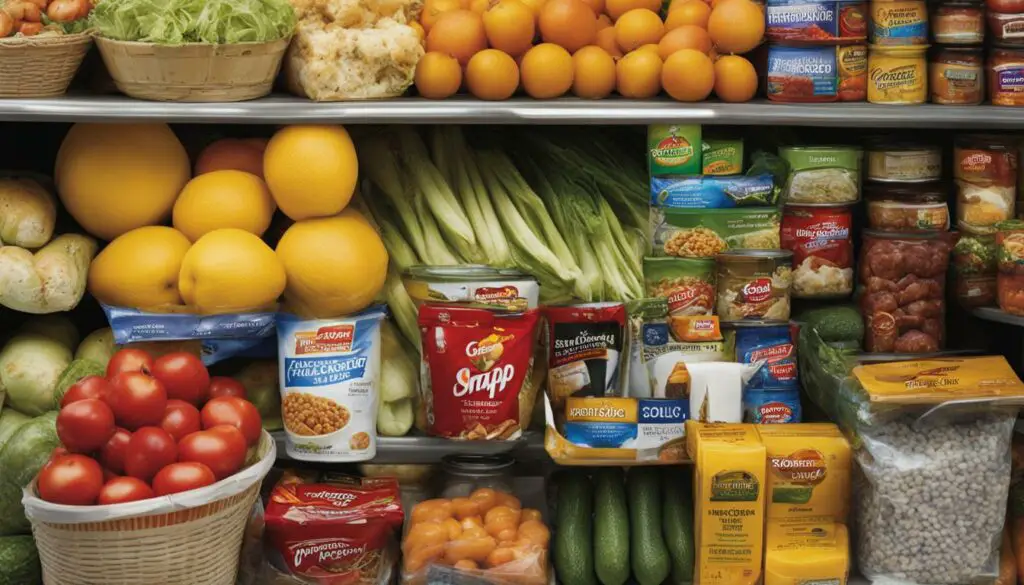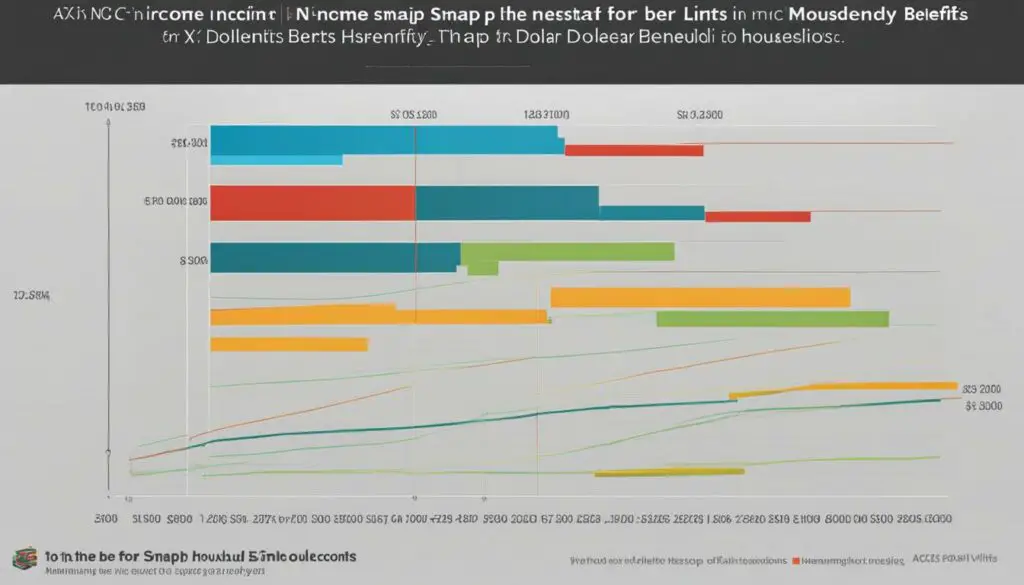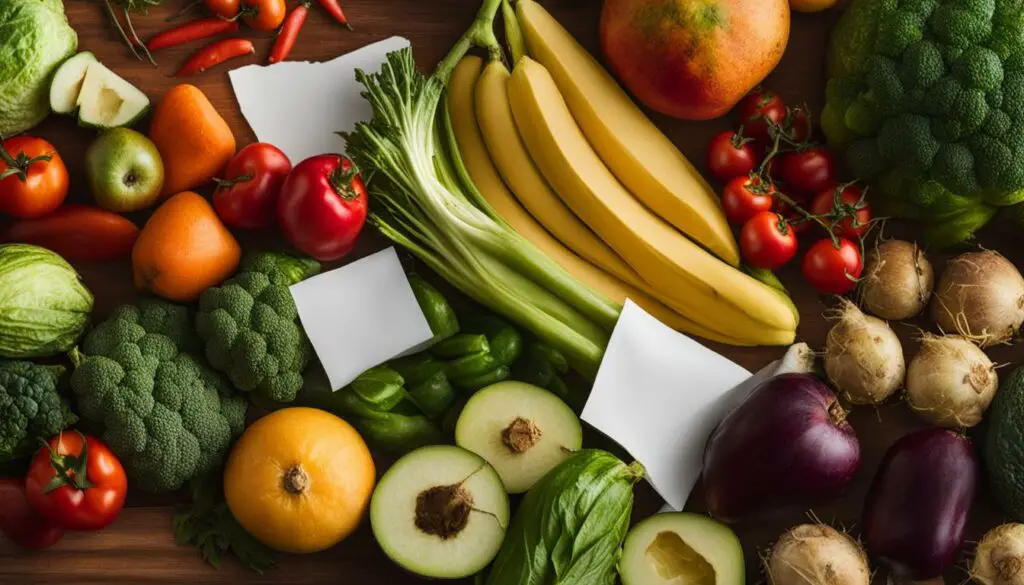Originally posted on December 5, 2023 @ 1:57 am
Welcome to our article on understanding the income limit for food stamps in North Carolina. If you’re seeking assistance with purchasing nutritious food, it’s important to know the eligibility requirements and income limits for the Supplemental Nutrition Assistance Program (SNAP). Let’s dive in and explore the details!
North Carolina sets its income limits for SNAP benefits based on household size. These limits vary depending on the number of people in the household and are subject to change annually. Eligibility is determined by comparing the household’s gross income to the maximum gross income limits set at 200% of the federal poverty level.
Table of Contents
Key Takeaways:
- The income limit for food stamps in NC is determined based on household size.
- Maximum gross income limits are set at 200% of the federal poverty level.
- Income limits vary annually and are subject to change.
SNAP Income Eligibility in North Carolina

To be eligible for SNAP benefits in North Carolina, applicants must meet certain income guidelines. These guidelines are based on the household’s gross income, which includes all sources of income before deductions. The income limits are determined based on the number of people living in the household. The maximum gross income limits for SNAP benefits in North Carolina range from $2,430 for a household of one person to $8,428 for a household of eight people. It’s important to note that there are additional criteria, such as household composition, resources, and citizenship/immigration status, that eligibility workers assess to determine SNAP eligibility.
Income eligibility for SNAP benefits is determined by comparing the household’s gross income to the federal poverty level. The federal poverty level is updated annually and varies based on household size. In North Carolina, the income limits for SNAP benefits are set at 200% of the federal poverty level. This means that households with incomes up to 200% of the federal poverty level may be eligible for SNAP benefits.
| Household Size | Maximum Gross Income |
|---|---|
| 1 person | $2,430 |
| 2 people | $3,282 |
| 3 people | $4,134 |
| 4 people | $4,986 |
| 5 people | $5,838 |
| 6 people | $6,690 |
| 7 people | $7,542 |
| 8 people | $8,428 |
“SNAP income eligibility in North Carolina is determined based on the household’s gross income. It’s important for applicants to understand that there are income limits based on household size. Eligibility workers also consider other factors, such as household composition, resources, and citizenship/immigration status.”
In addition to income limits, eligibility for SNAP benefits is also dependent on other factors such as household composition, resources, and citizenship/immigration status. Applicants must provide information about these factors when applying for SNAP benefits in North Carolina. It’s recommended to consult with the local county Department of Social Services (DSS) or use online tools like ePASS to determine eligibility and apply for SNAP benefits.
Understanding the income eligibility guidelines for SNAP benefits in North Carolina is crucial for individuals and families in need of assistance with purchasing nutritious food. By meeting the income requirements and providing accurate information about household size and composition, eligible applicants can access the support they need to ensure food security for themselves and their loved ones.
SNAP Student Requirements in North Carolina

Students between the ages of 18 and 51 may be eligible for SNAP benefits in North Carolina if they meet specific requirements. In addition to meeting the general eligibility criteria, students must meet one of the following exemptions:
- Work at least 20 hours a week
- Participate in a state or federally-financed work-study program
- Participate in an on-the-job training program
- Care for a child under the age of 6
- Care for a child aged 6 to 11 and lack necessary child care enabling school attendance and work 20 hours a week
- Be a single parent enrolled full-time in college caring for a child under 12
- Receive Temporary Assistance for Needy Families (TANF) assistance
International students are not eligible for SNAP benefits in North Carolina. It’s important for students to understand these requirements and exemptions to determine their eligibility for SNAP benefits and access the support they may need.
“The SNAP program provides vital assistance to students in need, enabling them to focus on their education without the worry of going hungry. By meeting specific requirements, eligible students can access financial support to help meet their food needs.”
Table: SNAP Student Requirements
| Student Requirement | Details |
|---|---|
| Work at least 20 hours a week | Students must be employed for a minimum of 20 hours per week in a qualifying job. |
| Participate in a state or federally-financed work-study program | Students engaged in a work-study program, funded by the state or federal government, are eligible for SNAP benefits. |
| Participate in an on-the-job training program | Students enrolled in a state or federally-approved on-the-job training program can qualify for SNAP benefits. |
| Care for a child under the age of 6 | Students who provide primary care for a child under 6 years old may be eligible for SNAP benefits. |
| Care for a child aged 6 to 11 and lack necessary child care enabling school attendance and work 20 hours a week | Students caring for a child aged 6 to 11, who cannot access suitable child care, may qualify for SNAP benefits. They must also work a minimum of 20 hours per week. |
| Be a single parent enrolled full-time in college caring for a child under 12 | Single parents enrolled full-time in college and caring for a child under 12 years old may be eligible for SNAP benefits. |
| Receive Temporary Assistance for Needy Families (TANF) assistance | Students receiving Temporary Assistance for Needy Families (TANF) assistance automatically meet the student eligibility requirements for SNAP benefits. |
It’s crucial for students to consider these exemptions and ensure they meet the necessary criteria to access SNAP benefits in North Carolina. By understanding the SNAP student requirements, eligible students can receive the financial support they need to focus on their education and well-being.
Applying for SNAP in North Carolina

Applying for SNAP benefits in North Carolina is a straightforward process that can be done online through the ePASS portal or by contacting the local county Department of Social Services (DSS). To begin the application, individuals will need to provide information about their household size, income, and resources. It’s important to ensure that all the information provided is accurate and up to date.
Once the application is submitted, it is typically processed within 30 days. However, expedited benefits may be available in emergency cases where the household has little to no income or resources. It’s important to note that elderly individuals receiving Supplemental Security Income (SSI) may be eligible for the Simplified Nutritional Assistance Program (SNAP) with simplified eligibility criteria.
For those who prefer to apply in person or need assistance with the application process, the local county DSS is there to help. They can provide guidance, answer any questions, and ensure that individuals understand the requirements and eligibility criteria for SNAP benefits. Don’t hesitate to reach out and seek assistance if needed.
Table: Required Information for SNAP Application
| Information | Explanation |
|---|---|
| Household Size | The total number of people living in the household, including children and adults. |
| Income | Gross income from all sources before deductions, including wages, self-employment income, and government benefits. |
| Resources | The total value of assets owned by the household, such as cash, bank accounts, and vehicles. |
| Expenses | The amount spent on housing, utilities, and other necessary expenses. |
Source: Second source, Third source
Household Composition and SNAP Eligibility

Household composition is a key factor in determining eligibility for SNAP benefits in North Carolina. To qualify for food stamps, anyone living in the applicant’s household and purchasing or making food together is considered a member of the household. This includes children under the age of 22, elderly and disabled individuals if food is purchased or made for them, and individuals who live together and purchase or make food together.
However, there are some exceptions to this rule. Adult children aged 22 and above who buy or make their own food and tenants who rent a room do not count as household members for SNAP eligibility purposes. It’s important to consider all household members when determining SNAP eligibility to accurately assess the size and needs of the household..
Understanding and correctly identifying household composition is crucial in determining SNAP eligibility. By including all eligible household members, applicants can ensure they meet the necessary criteria and receive the assistance they need to purchase nutritious food. The table below summarizes the household members that count towards SNAP eligibility and those that do not.
| Household Members Counted | Household Members Not Counted |
|---|---|
| Children under the age of 22 | Adult children aged 22 and above buying/making their own food |
| Elderly and disabled individuals if food is purchased or made for them | Tenants renting a room |
| Individuals who live together and purchase or make food together |
“Understanding and correctly identifying household composition is crucial in determining SNAP eligibility.”
By considering all household members, applicants can ensure they meet the required criteria and receive the support they need. It is crucial to accurately assess household composition to determine SNAP eligibility and access the benefits that can help provide access to adequate and nutritious food for families in need.
Income Limits and Calculation for SNAP Benefits

In North Carolina, the income limits for SNAP benefits are determined based on household size and income. The maximum gross income limits for SNAP eligibility range from $2,430 for a household of one person to $8,428 for a household of eight people. It’s important to note that these income limits are subject to change annually. Eligibility workers assess a variety of factors, including income, when determining SNAP eligibility.
To calculate SNAP benefits, the household’s net income is taken into account. Net income is calculated by subtracting allowable deductions from the household’s gross income. These deductions can include expenses such as housing costs, dependent care expenses, and medical expenses for elderly or disabled members of the household. The actual benefit amount may vary depending on the household’s specific circumstances.
It’s important to understand that an increase in net income generally results in a reduction of SNAP benefits. For example, an increase of $100 in net income can lead to a decrease of $30 in benefits. This reduction is due to the income-based formula used to calculate SNAP benefits.
| Household Size | Gross Monthly Income Limit |
|---|---|
| 1 | $2,430 |
| 2 | $3,282 |
| 3 | $4,133 |
| 4 | $4,984 |
| 5 | $5,836 |
| 6 | $6,687 |
| 7 | $7,538 |
| 8 | $8,428 |
It’s important to consult with the local county Department of Social Services (DSS) or use online tools like ePASS to apply for SNAP benefits and determine the exact benefit amount for your household.
Non-citizen Eligibility for SNAP in North Carolina

“Can non-citizens in North Carolina qualify for SNAP benefits?” This is a common question among immigrants and individuals with qualified alien immigration status. The answer is yes – non-citizens who meet certain criteria may be eligible for SNAP benefits in North Carolina.
In order to qualify, non-citizens must have qualified alien immigration status. This includes individuals such as refugees, victims of trafficking, Cuban and Haitian immigrants, and Iraqi and Afghan immigrants with special status. It’s important to note that international students are not eligible for SNAP benefits.
To determine eligibility, non-citizens must meet all other SNAP criteria, including income and resources. The income limits for SNAP benefits in North Carolina vary based on household size, and eligibility workers assess these factors to determine eligibility. It’s crucial for non-citizens interested in applying for SNAP benefits to consult with the local county Department of Social Services (DSS) to navigate the application process and understand the specific requirements.
Table: SNAP Eligibility for Non-Citizens in North Carolina
| Immigration Status | Eligibility for SNAP in NC |
|---|---|
| Refugees | Eligible |
| Victims of trafficking | Eligible |
| Cuban and Haitian immigrants | Eligible |
| Iraqi and Afghan immigrants with special status | Eligible |
| International students | Not eligible |
Non-citizens who meet the necessary requirements can receive the same SNAP benefits as eligible citizens. It’s important for individuals with qualified alien immigration status to explore the available resources and assistance programs, such as SNAP, to ensure access to nutritious food for themselves and their families.
Homeless Individuals and SNAP Eligibility in North Carolina

Homelessness should not be a barrier to accessing SNAP benefits in North Carolina. The state understands the challenges faced by those without a permanent mailing address or stable housing, and provisions are in place to ensure that they can still apply and receive assistance. Regardless of their housing situation, homeless individuals can apply for SNAP benefits and receive the support they need to purchase nutritious food.
Applying for SNAP benefits as a homeless individual follows the same process as for anyone else. The application can be submitted through the online tool ePASS or by contacting the local county Department of Social Services (DSS). The eligibility requirements and criteria for homeless individuals remain the same, including meeting income limits, household composition, and other key factors. It’s important to ensure that all required information is provided accurately to facilitate the application process.
SNAP benefits for homeless individuals can make a significant difference in their ability to access food and maintain their health. By providing financial assistance specifically for purchasing food, SNAP helps ensure that homeless individuals have access to nutritious meals. It’s essential to highlight that the lack of a mailing address or living in a shelter that offers free meals does not disqualify someone from receiving SNAP benefits. The focus is on meeting the eligibility criteria and providing necessary documentation to support the application.
Snap Eligibility without Mailing Address
“Homeless individuals in North Carolina can still apply for SNAP benefits, even if they do not have a mailing address or permanent housing. The lack of a mailing address or living in a shelter that provides free meals does not disqualify someone from receiving SNAP benefits.”
By ensuring that homeless individuals are eligible for SNAP benefits, North Carolina shows its commitment to supporting those in need and addressing food insecurity. Through SNAP, homeless individuals have the opportunity to access vital resources and improve their overall well-being. The program helps bridge the gap between homelessness and stability, providing a safety net during challenging times.
Other Benefits Eligibility in North Carolina
Aside from SNAP benefits, residents of North Carolina may be eligible for other assistance programs that can provide additional support. These programs cover a wide range of needs, including healthcare, childcare, housing, and more. To determine eligibility for these benefits, individuals can use the Benefit Finder tool provided by the North Carolina government.
The Benefit Finder tool is a valuable resource that helps individuals identify and apply for the various assistance programs available based on their specific circumstances. By inputting personal information and answering a series of questions, the tool provides a list of programs for which individuals may qualify. This ensures that individuals can access the support they need and maximize the available resources.
Whether it’s medical assistance, energy support, or food security, the Benefit Finder tool simplifies the process of finding and applying for benefits. It is recommended that individuals take advantage of this tool to explore the various assistance programs and determine eligibility. By utilizing the available resources, individuals can access the support they need to improve their quality of life.
| Program | Description | Eligibility Criteria |
|---|---|---|
| Medicaid | Healthcare coverage for low-income individuals and families | Based on income and household size |
| Child Care Subsidy | Financial assistance to help cover the cost of child care | Based on income and necessity for child care |
| Low-Income Energy Assistance Program (LIHEAP) | Assistance with heating and cooling costs | Based on income and household size |
| Section 8 Housing Choice Voucher Program | Rental assistance for low-income individuals and families | Based on income and household size |
These are just a few examples of the assistance programs available in North Carolina. Eligibility criteria may vary for each program, so it’s important to use the Benefit Finder tool to determine eligibility for specific programs and explore the full range of benefits and resources that are available.
NC State Non-Discrimination Statement
NC State University is committed to providing an inclusive and welcoming environment for all individuals. We strive to foster a community that values diversity and respects the rights and dignity of every person. Our non-discrimination statement reflects our commitment to equal opportunity and prohibits discrimination and harassment based on age, color, disability, gender identity, genetic information, national origin, race, religion, sex (including pregnancy), sexual orientation, and veteran status.
At NC State University, we believe that diversity enriches our campus and is vital to our educational mission. We are dedicated to creating a culture of inclusivity where everyone feels valued and supported. Discrimination, harassment, and bias have no place in our community, and we are dedicated to addressing and preventing such incidents.
“NC State University promotes equal opportunity and prohibits discrimination and harassment based on age, color, disability, gender identity, genetic information, national origin, race, religion, sex (including pregnancy), sexual orientation, and veteran status.”
We encourage all members of the NC State community to familiarize themselves with our non-discrimination statement and to actively participate in creating a welcoming and respectful environment. If you believe you have experienced discrimination or harassment, we have resources available to support you. Please visit our website or contact the Office for Institutional Equity and Diversity for more information on how to report incidents and seek assistance.
Table: Categories Protected by NC State Non-Discrimination Statement
| Protected Categories |
|---|
| Age |
| Color |
| Disability |
| Gender Identity |
| Genetic Information |
| National Origin |
| Race |
| Religion |
| Sex (including pregnancy) |
| Sexual Orientation |
| Veteran Status |
Conclusion
Understanding the income limit for food stamps in NC is crucial for individuals and families seeking assistance with purchasing nutritious food. The income limits vary based on household size, ensuring that the program reaches those who need it most. North Carolina’s SNAP program, also known as the Supplemental Nutrition Assistance Program, provides vital support to eligible residents in need.
When determining eligibility, the income limits are just one aspect taken into consideration. Factors such as residency, citizenship/immigration status, and household composition also play a role in determining SNAP eligibility. It’s important to consult with the local county Department of Social Services (DSS) or utilize online tools like ePASS to apply for SNAP benefits and explore other available resources and assistance programs.
By understanding the income requirements for food stamps in NC, individuals and families can access the support they need to ensure food security and better overall well-being. SNAP benefits provide a lifeline to those facing economic challenges, and the program aims to empower individuals and families to achieve self-sufficiency and a healthier lifestyle. If you or someone you know may be eligible for SNAP benefits, it’s essential to take advantage of this valuable resource.
FAQ
What is the income limit for food stamps in NC?
The income limit for food stamps in North Carolina is determined based on household size. The maximum gross income limits range from $2,430 for a household of one person to $8,428 for a household of eight people.
What are the SNAP income eligibility guidelines in North Carolina?
Eligibility for SNAP benefits in North Carolina is determined based on household gross income. The income limits vary depending on the number of people in the household. The maximum gross income limits range from $2,430 for a household of one person to $8,428 for a household of eight people.
Are students eligible for SNAP benefits in North Carolina?
Students between the ages of 18 and 51 may be eligible for SNAP benefits in North Carolina if they meet specific requirements. They must also meet one of the following exemptions: work at least 20 hours a week, participate in a state or federally-financed work-study program, participate in an on-the-job training program, care for a child under the age of 6, care for a child aged 6 to 11 and lack necessary child care enabling school attendance and work 20 hours a week, be a single parent enrolled full-time in college caring for a child under 12, or receive Temporary Assistance for Needy Families (TANF) assistance.
How can I apply for SNAP benefits in North Carolina?
North Carolina residents can apply for SNAP benefits through an online tool called ePASS or by contacting the local county Department of Social Services (DSS). The application process requires providing information about household size, income, and resources.
Does household composition affect SNAP eligibility?
Yes, household composition plays a crucial role in determining SNAP eligibility. Anyone living and purchasing or making food with the applicant counts as a member of the household. However, adult children (22+) who buy/make their own food and tenants renting a room do not count as household members.
How are SNAP benefits calculated in North Carolina?
SNAP benefits in North Carolina are calculated based on household size, income, and allowable deductions. The actual benefit amount may vary from family to family, with an increase of $100 in net income generally resulting in a reduction of $30 in benefits.
Are non-citizens eligible for SNAP benefits in North Carolina?
Non-citizens who have qualified alien immigration status may be eligible for SNAP benefits in North Carolina. Eligibility is based on immigration status, and applicants must meet all other SNAP eligibility criteria, including income and resources.
Can homeless individuals apply for SNAP benefits in North Carolina?
Yes, homeless individuals in North Carolina can still apply for SNAP benefits, even if they do not have a mailing address or permanent housing. The lack of a mailing address or living in a shelter that provides free meals does not disqualify someone from receiving SNAP benefits.
Are there other benefits available in North Carolina?
In addition to SNAP benefits, there may be other benefits available to eligible individuals and families in North Carolina. The Benefit Finder tool provided by the North Carolina government can help individuals identify and apply for other assistance programs based on their specific circumstances.
What is the non-discrimination statement at NC State University?
NC State University promotes equal opportunity and prohibits discrimination and harassment based on age, color, disability, gender identity, genetic information, national origin, race, religion, sex (including pregnancy), sexual orientation, and veteran status.
Source Links
- https://www.morefood.org/using-snap/am-i-eligible/
- https://www.joinproviders.com/state/north-carolina/food-stamps-eligibility-income-limits/
- https://singlemotherguide.com/north-carolina-snap/
See also:
Leave a Reply